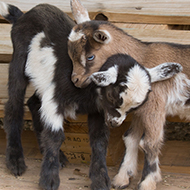Goat kids should be treated differently to calves, study finds

"Managers must recognise that goat kids are not small calves.”
A study by scientists in New Zealand has concluded that there is a need for goat kids to be treated differently to small calves.
The study, published in the journal Animal Welfare, follows concerns relating to disbudding, a practise routinely conducted in calves and goat kids to avoid injury to other animals, farm animals and damage to the environment.
Researchers considered the existing scientific literature, compared the disbudding methods for calves and kids, reviewed the behavioural and physiological responses of the two species to disbudding, and identified alternatives to disbudding along with refinements of current practices.
They concluded that the effect of iron temperature and application deserved special consideration to reduce pain and injury, and to increase effectiveness. Pain and injury associated with disbudding could be eliminated by changing herd management to allow for horned goats, or breeding and farming polled (hornless) animals, the researchers said.
The team also found that alternative disbudding methods, including caustic paste and cryosurgical disbudding, are more painful than cautery disbudding and may not be useful alternatives. They state that while clove oil injection appears to cause a similar experience of acute pain as cautery disbudding, the current method may cause longer-term inflammatory pain, and is therefore ineffective at preventing horns and scurs.
“Until a less painful and efficacious alternative is realised, it appears that adapting cautery disbudding methods using pain mitigation is the best option currently available for farmed dairy goats,” commented lead author, Dr Melissa Hempstead. “In order for the industry to establish best practice guidelines for disbudding goat kids, managers must recognise that goat kids are not small calves.”



 The Animal and Plant Health Agency (APHA) has updated its online reporting service for dead wild birds.
The Animal and Plant Health Agency (APHA) has updated its online reporting service for dead wild birds.